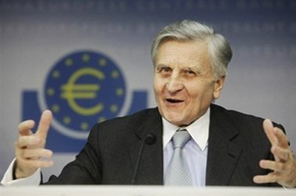ECB keeps key interest steady at record 1.0%
LUXEMBOURG: The European Central Bank kept its key interest steady at a record low of 1.0 percent Thursday to underpin lending as a threat of deflation loomed over the 16-nation eurozone.
The ECB governing council, which met in Luxembourg for one of two annual meetings in a member country, left two other reference rates, the marginal lending rate and the deposit rate, unchanged as well at 1.75 percent and 0.25 percent, respectively.
After a rate cut in May and the presentation of a corporate bond purchase programme in June, both aimed at battling the eurozone's first recession, "the wait-and-see game has now begun," ING economist Carsten Brzeski said.
In Sweden, which is not a eurozone member, central bank officials cut their key interest rate to a record low of 0.25 percent to boost that country's flagging economy.
But in Iceland Thursday, the central bank held its key rate at 12 percent following four cuts in the last three months.
In Luxembourg, ECB president Jean-Claude Trichet was sure to face quetions on deflation at a press conference that follows the rate decision.
Eurozone consumer prices fell in June for the first time since the European Monetary Union was formed, with a provisional inflation figure of minus 0.1 percent that was far below the central bank target of just under 2.0 percent.
"Trichet will be keen to play that issue down," Barclays Capital economist Thorsten Polleit told AFP after the decision was announced.
Brzeski expected Trichet to stress the bank did not consider 1.0 percent an absolute floor for the main rate, and that "good and timely exit strategies are needed" to undo monetary stimulus measures once a solid recovery was underway.
With the economy floundering in recession, the ECB launched an enormous life raft last week, lending banks 442 billion euros (626 billion dollars) for a year at 1.0 percent, the most it has ever provided at one time.
It was the central bank's first 12-month refinancing operation and drew an all-time high of more than 1,100 commercial banks.
The ECB must now deal with the threat of deflation.
A broad-based decline in prices, which is not yet the case, could incite households and businesses to postpone spending, undermining activity and threatening jobs that are already being lost rapidly in countries like Ireland and Spain.
Rising unemployment could then reinforce falling prices by putting pressure on wages that contribute to core inflation, as opposed to volatile oil prices that are the main reason for the current decline.
"The risk that consumer prices will fall for longer than currently expected is very real in our view," economists at Capital Economics warned.
Slumping producer prices and a glut of industrial output capacity because of the recession were other potential aggravating factors.
But Polleit said: "We live in a world of paper money and that can be produced in any quantity required," something he felt significantly diminished the threat of deflation.
Meanwhile, the ECB plans to buy 60 billion euros' worth of low-risk corporate bonds to prime business finance markets and has urged banks to lend more rather than hoard the windfall loans to dress up their books.
"But, while it is early days to judge the impact of this, there is clearly no guarantee that banks will lend the money to firms and households," Capital Economics economist Jennifer McKeown said.
Commercial banks are trying to limit risks faced by lending to companies and households after getting stung during the US subprime crisis and failure of the investment bank Lehman Brothers.






